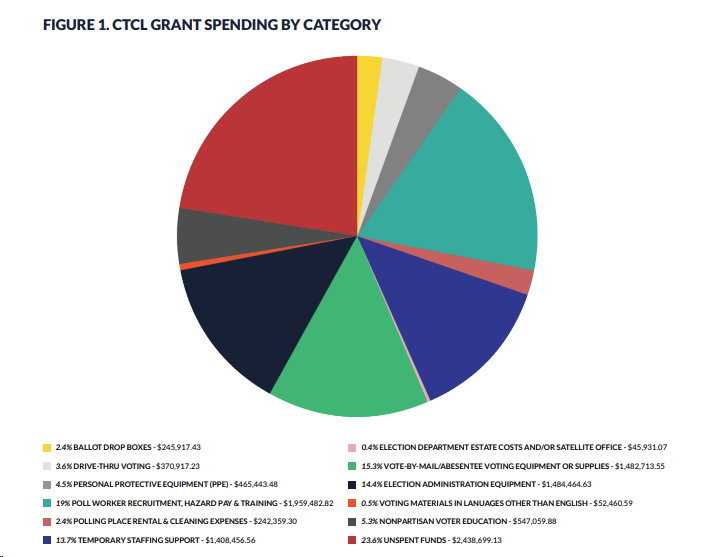This post originally appeared at https://will-law.org/protect-wisconsins-elections/
On April 2nd, Wisconsin voters will have the opportunity to vote on two proposed amendments to the State Constitution that will improve the integrity of elections in the state. But what are they, and what do they do?
The Amendments
The wording of the two questions is below:
Question 1) Use of private funds in election administration. Shall section 7 (1) of article III of the constitution be created to provide that private donations and grants may not be applied for, accepted, expended, or used in connection with the conduct of any primary, election, or referendum?”
Question 2) “Election officials. Shall section 7 (2) of article III of the constitution be created to provide that only election officials designated by law may perform tasks in the conduct of primaries, elections, and referendums?”
Question 1 deals with banning the practice of private funding in general. No longer would municipalities be able to accept money from outside special-interest entities like CTCL for election administration. Question 2 would prevent outside special interests that are not lawful election-officials from becoming involved in the official election administration process.
WILL recommends a YES vote on both Questions 1 and 2
Both of the proposed amendments stem from the so-called “Zuckerbucks” that were spent in Wisconsin during the 2020 election. Largely financed by a grant from Meta CEO Mark Zuckerberg via the Center for Technology and Civic Life (CTCL), more than $10 million dollars was sent to Wisconsin municipalities for election administration. The money was not distributed in an equitable way, with larger and more Democratic-leaning cities receiving more funding than other cities in the state.
Some of the money was spent on questionable and even illegal activity. In Green Bay, after receiving $1.6 million from CTCL, an employee of the political group was given access to absentee ballots, and even offered to help with the ballot curing process. In Racine, CTCL funding was used to finance a voter van that was later found in Court to have illegally been deployed disproportionately to Democratic-leaning areas of the city. While the money in 2020 was ostensibly given because of special concerns regarding the pandemic, the flow of money has not stopped in 2024. At minimum, both Madison and Milwaukee have accepted grants for election administration since 2023.But even beyond such questionable activities, private funding creates an unfair situation when some municipalities realize the benefits of additional election administration funding while others do not. The figure below is reproduced from WILL’s CTCL report (linked above) in which we conducted open records requests of all municipalities that received CTCL grants.
But even beyond such questionable activities, private funding creates an unfair situation when some municipalities realize the benefits of additional election administration funding while others do not. The figure below is reproduced from WILL’s CTCL report (linked above) in which we conducted open records requests of all municipalities that received CTCL grants.

Much of this money was spent to simplify the voting process, as well as for activities like Get-Out-the-Vote (described here as “nonpartisan voter education”). Whether other cities could have received grants simply by asking CTCL for funding is somewhat irrelevant—people who lived in those communities that did not receive grants were unfairly denied equal access to these activities.
While most of the spending so far has benefitted Democratic candidates, there is no reason to think that conservative billionaires might not decide to get in on the action as well. And while organizations like CTCL at least maintain a veneer of non-partisanship, there is currently no legal requirement that private money be spent in a manner that even approximates fairness. The next private funder may expressly only provide funding to left- or right- leaning areas with no pretense of objectivity. Under current law, this would be totally legal.
The Need for More Funding?
Election administrators complain that they are underfunded, and this money was needed. The credibility of this claim is questionable. Many municipalities in Wisconsin successfully completed their 2020 election duties without private funds, including large municipalities likes Oshkosh. That said, a discussion can be had about the need for additional funding from public sources. The cure can’t be worse than the disease, which the current situation is by distributing private funding inequitably.
A Bipartisan Solution
Since the 2020 election, 27 states have passed bills banning or limiting private funding. This includes Pennsylvania, where the bill was signed into law by a Democratic Governor. The prospect of Elon Musk or the NRA strategically funding elections ought to be just as scary to those on the left as Mark Zuckerberg has been for those on the right. Whatever side of the aisle you find yourself on, these amendments deserve serious consideration.
The post Protect Wisconsin’s Elections! appeared first on Wisconsin Institute for Law & Liberty.